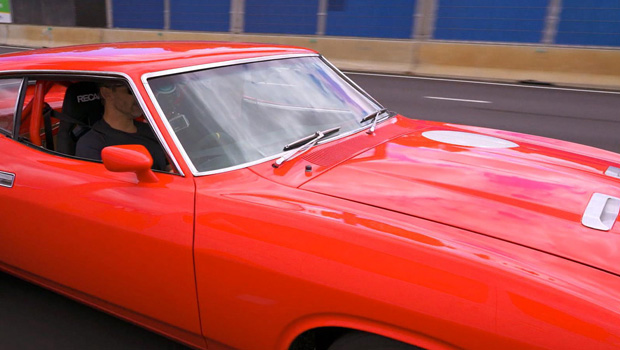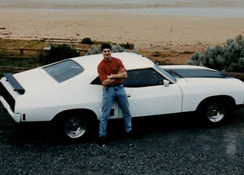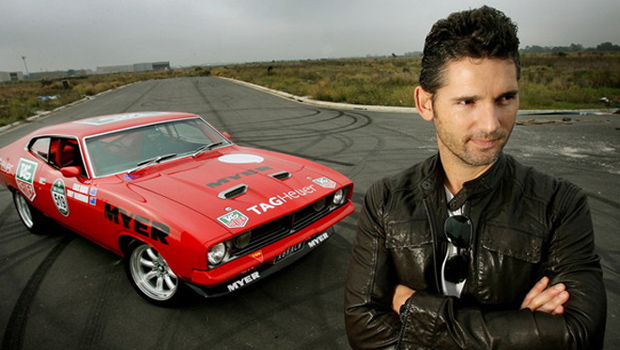Eric Bana: A driven actor
Eric Bana is one very busy, and very driven, actor. Even so, he found time to talk about roles past and present with our Seth Doane:
You may remember him battling Brad Pitt as Prince Hector in "Troy"; or as an Israeli intelligence agent in Steven Spielberg's "Munich"; or starring as Bruce Banner in the blockbuster "The Hulk."
But the body of work actor Eric Bana may be most proud of is his 1974 Ford X-B Falcon Coupe. Bana bought it when he was fifteen. He's trashed it, rebuilt it, and customized almost every bit of it.
Doane asked,"What was it that you just loved about this car?"
"Well, you remember the movie 'Mad Max'? This was the same car that Max had in the film, and it's my favorite film of all time. I just think they're beautiful. And they're muscular. And they're getting extremely rare."
He paid just over a thousand dollars for it more than three decades ago, and has no idea how many hours he's spent under the hood.
So, Doane asked, "Can we take it out?"
"It would be criminal not to," Bana replied.
On the streets of Melbourne, Australia, Hollywood feels far away ... and maybe that's the point.
"It's a flashback thing," Bana said of tearing through the streets. "I mean, when I sit in this car and I drive and I look out through that windscreen, it's like I've spent three-quarters of my life looking out that windscreen."
Before he became one of Australia's best-known movie stars, he was just a kid from a working-class Melbourne family. Revisiting his old neighborhood, he said, "Grew up here -- spent most of my time actually in the garage out in the back. As much time in the garage as in the house, pretty much."
It was there that he discovered he had a gift for impersonations. "I started out doing impressions of other family members -- grandfather, uncles, aunties," he said. "And then doing the occasional famous person, and getting attention for it and getting out of trouble. Being able to get out of trouble by having a party trick was where the power lay."
"What do you mean, 'out of trouble'? Like, you're gonna get beaten up and you impersonate someone?"
"Yeah! At the train station, someone's got you in a headlock and you pull out a Colombo impression or something," Bana laughed. "Not quite!
"No, I mean at school I found the teachers were far more lenient if you could make them laugh."
The quick, dry wit of an actor who started in comedy was immediately clear when machinery interrupted Doane's interview.
"There are times when I wished that I had my own forklift!" Bana quipped.
Bana had a reputation for joking around not just in school, but at the many odd jobs he had growing up.
The pub where he was a bus boy would feature standup comedians, and one night a guy he worked with had an idea: "He pulled me aside, he was a mate of mine, and he said, 'You carry on like an idiot after work for the staff. You should do some of that stuff on stage.'"
Bana ultimately got his act on TV, and developed a following on an Australian sketch comedy show.
But it was his role as a convicted murderer in the popular Australian film "Chopper" that made Hollywood take notice. Director Ridley Scott was so impressed by his performance that he cast him in "Black Hawk Down" without an audition.
Now he's going back to war, this time with a comedic twist, in a new Netflix film, "Special Correspondents." Bana jumped at the chance to work opposite Ricky Gervais: "I'm like, are you serious? Like, he'll permit me to go and be in the film with him? That was my first reaction. It's really nice to be such a huge fan of someone that you can't imagine working with them."
In the comedy written and directed by Gervais, Bana plays a radio reporter who pretends to cover a foreign war but never leaves his hometown.
To watch a trailer for "Special Correspondents" click on the player below.
In real life Bana is happy to spend time in his hometown, too -- being in Melbourne with his wife and kids ... and, of course, near that car.
"One of the problems with being an actor is, nothing I can do about being an actor today other than read a script, you know? What a useless skill to have! An absolutely useless skill!"
"You're not sitting in your office putting on plays for yourself?" Doane asked.
"Well, what time is it? There's a matinee this afternoon, Seth!"
"But working on your car gives you something tangible?"
"Yeah, I can see that I've done a good or bad job on something. And it takes you out of your own head."
Tinkering with the car is more than a hobby; he keeps it tuned up so he can race.
In 2009, he combined his two passions and produced a documentary called "Love the Beast," which chronicles his preparations and competition in the hair-raising street race Targa Tasmania.
Bana says that while he understands adrenaline is involved, for him, "it's almost the opposite. To me it's very, very calming, very relaxing. It's one of the few things that you can do where the only pressure comes from myself."
Looking back at his career, it seems Bana is almost surprised by his success. He likened the chance to play leading, serious roles in Hollywood to being admitted into an exclusive club.
"It's like I got a pass," he said, "and I got in there, and they didn't know about the comedy background. And it was kind of like having a fake passport. And so when these jobs kept coming my way, I was like, 'Well, this is kind of a dream. This is what I always wanted to do.' I just didn't think it would ever happen."
"Because you didn't think it would happen, or you didn't think you could do it?"
"I didn't think the opportunity would present itself."
Now Eric Bana is just enjoying the ride.
For more info:
- "Special Correspondents" (Nextflix); available April 29
- Follow @EricBana67 on Twitter
- "Love the Beast" available on iTunes


